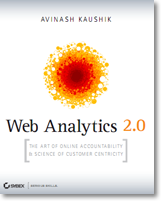 A reader from Tehran, Iran emailed asking for a model by which he could judge how competent his company was at competitive intelligence. Tough question. At the end of this post I'll share my attempt at a model that you can use to judge at what level your company is operating.
A reader from Tehran, Iran emailed asking for a model by which he could judge how competent his company was at competitive intelligence. Tough question. At the end of this post I'll share my attempt at a model that you can use to judge at what level your company is operating.
But first I wanted to share a podcast I recently did with Eric Enge from StoneTemple Consulting on the topic of competitive intelligence.
There has been a lot of buzz about competitive intelligence and a lot of interest in conflicting marketing claims. It is hard, it is complex but hopefully your find something interesting and actionable in my podcast with Eric.
Podcast Summary: We started by talking about why competitive analysis should be a part of ever web analytics program (now that there are so many free options as well). We covered the top competitive intelligence vendors, the data capture methodologies they use and the strengths of each vendor.
Download the Podcast:
Podcast Details: Here are the questions we covered in the podcast:
- 1. Why do you think we need to do competitive intelligence analysis as a part of web analytics
2. Can you talk a little bit about using Hitwise as an analysis tool?
3. Can you talk a little bit about using ComScore as an analysis tool?
4. Can you talk a little bit about using Alexa as an analysis tool?
5. Are you familiar with Quantcast and Compete? Can you comment on these?
6. You recently posted about some other neat tools. In this post you talked about the Search funnels function from MSN. Can you talk about that a bit?
7. In that same post you also talked about MSN’s keyword / key phrase forecast tool. How does that fit into a businesses web site plan?
8. For a final question, let’s shift gears a bit, because this is one of the most interesting things we’ve discussed. How would you recommend a company get started when they are getting into analytics for the first time?
In my humble opinion each company / Analyst should spend at the minimum 10 – 15% of their time doing competitive analysis because it is the only way you will provide the “ecosystem” context to the data you are getting from your Web Analytics data.
If you are not doing competitive analysis (using any tools above that you prefer) then you are optimizing and measuring success with blinders on. You’ll go straight and make turns etc, but without the benefit of the 360 degrees view (which could have a huge influence your turns and the direction you take).
Competitive Intelligence Competency Judgment Model:
So if you do spend 10% of your time doing competitive analysis how do you figure out what level of competency you are at? There isn't a standard model you can use, it is still a evolving field. But I would look for these things:
Level Nada:
* You do nothing, you are focussed on your website analytics and that forms all of your reporting and every element on your dashboard. You have unlimited potential for improvement.
* This one's tricky: You currently only measure conversion rate for your competitor using one of the many tools. This is also level nada because usually there is little actionable insight that comes from this exercise. (For more on this click here.)
Level Three:
* Do you know your share of traffic compared to your competitors?
* Do you know the trend of traffic over the last six to twelve months compared to your competitors?
* What are the organic rankings of the top search keywords for you with respect to your competition?
Level Two:
* Do you know what % of your traffic comes from search engines and what % is it for your competitors?
* What is your share of visitors you get from search engines for your top five non-branded keywords, what what is the share that your competitors are getting?
* What are the top five websites referring traffic to your website and what sites are referring traffic to your competitors?
Level One:
* Are you doing search funnel analysis for your keywords and your competitors keywords?
* What affiliates and banner ads networks work for your competitors successfully? Are you using them? Should you use them?
* Do you know which are the sites that are not your direct competitors but are getting traffic for your non-branded keywords? What is your strategy to deal with them?
You can use the answers to questions in each level in the model above to judge what level you are at. How's that for simple!
A Recommendation:
Jim Sterne's Emetrics summits are a premier destination for learning about all things Web Analytics. I have spoken at past Emetrics summits and am a Net Promoter of the events (emetrics DC '06 reflections). The next set of conferences are in London, March 29 (Agenda, Speakers) and San Francisco, May 7 (Agenda, Speakers). Jim's very kindly invited me to speak at both events and I hope to see many of you there.
As always please share your feedback via comments about this post, I would love to get your feedback on the competency model suggested above or anything else for that matter.
[Like this post? For more posts like this please click here.]





 Via
Via 














Nice podcast. Thanks for posting this.
Hi Avinash,
A very timely post. What an informative podcast! It serves as a one stop shop to get a macro and micro(ish) perspective on the competitive tools out there and the methodologies. I have personally found that the marketeers get hung on the forest when comparing the audience measurement tools with the analytics data. This is an informative way on curbing that myth! THANK YOU again!
Can I impose on you to share some of your insights (practical) on how you have accomplished tying both the competitive and more importantly the behavioral pieces? Some practical points would be of tremendous value please!
Great post, and podcast, Avinash. The podcast cuts through the marketing clutter and helps explains in layman's terms what each service does and how it works.
The competency model is also going to be very useful in our company. We are what you call "Level Nada" but are taking steps to fix that. Now we have a benchmark against which we can measure our progress. Thanks.
Peter.
Anonymous: Specifically for competitive intelligence read these two posts on what kinds of analysis should be done and in each case what actions can be taken:
Five Free “Advanced” Web Analytics Examples: Look Outside, Think Different.
Competitive Intelligence Analysis: Metrics, Tips & Best Practices
It is really impossible, and perhaps not even advisable, to tie the competitive intelligence data with the clickstream data from your own website web analytics tool. The data collection is very different and the purpose is very different.
In the context of competitive intelligence you are comparing two entities (you and your competitor) using the same tool / process / application and that normalizes the "bias". All other things being equal you can still find actionable insights and make fundamental changes to your strategy.
Hope this helps.
-Avinash.
Hi Avinash,
Sometimes you explain such complicated subjects in so simple words… I think Israel's government should bring you here to try solving the Middle East conflict. I can see you lecturing for both Palestinians and Israelis and everyone with a shocked expression: "Why did we fight terrible wars for 60 years? How couldn't we see that the solution was so simple? Just a JavaScript and a few logs!!!" What do you say? ;-)
Your podcast is great, really insightful. I have worked heavily with Hitwise last year and I believe we had some very precious results. But I felt that people were really frustrated that WebTrends/ClickTracks numbers weren’t even close to Hitwise’s. Not the increase/decrease in traffic and not the keywords we use. No matter how much I tried to explain that Hitwise is not about numbers, but about trends, managers didn’t recover from the initial shock.
Now I have a slightly lower budget and Alexa is the only option… but I feel so statistically sick about their numbers, there are so many biases… I try to comfort myself with the same “it is not about numbers, it is about trends” but now I understand what they felt :-)
In fact, you said just a few words about the most difficult competitive analysis task (IMHO): defining the competitors. There so many of them and, as you said, it is so hard to understand who, where, and what they are, that analyzing competitors become a very abstract concept. Then, you find yourself comparing your website to the big guys, YouTube, MySpace, Facebook… and again: frustration! But I think that as a Web analyst I am becoming more and more used to it ;-)
Just a slight comment about what you said on Quantcast being more Web Analytics oriented. On March, Hitwise bought HitDynamics and they were really serious about getting into Web Analytics features, but since then they did not release any related feature. Let’s wait and see…
Hope it adds to the discussion.
Have a great weekend!
Daniel
There is no point stepping in a battle without a good solid strategy. This rule applies to any business and practice. Marketing, and especially Internet marketing, requires you to have not just a good business offering but also a competitive edge over the hundreds and thousands of possible competitors. In SEO world, you are competing for visibility and “opportunity to see” (OTS) and with strong competitors your job just gets harder.
The very first steps in our SEO consulting services include a thorough competitive analysis of your website as well as your competitors’ websites. A website competitive analysis conducted through detailed research and along several established parameters can tell you exactly what your competitor is doing and how you can better it.
It is really impossible, and perhaps not even advisable, to tie the competitive intelligence data with the clickstream data from your own website web analytics tool. The data collection is very different and the purpose is very different.
Hi Avinash,
I found this post very useful. However I still have a couple of questions:
1. Do you think that any value or insight can be extracted from comparing two different sources of information like Comscore and Hitwise, for the same website?
2. If you have a website with a decent amount of traffic (+1M UV/month and +4PV/Visit), and Hitwise shows one trend and Comscore the opposite one, then which one do you trust? How do you determine which one is the real insight?
3. Which do you think could be the role of Google Ad Planner in this mixture?
Thank you in advance for your answers.
Jose
Jose: Here is a stab at your Competitive Intelligence questions…..
Both ComScore and HitWise being unique things to the table, and each of those is very different.
ComScore is good at deeper website behavior (if your website gets greater than one million unique visitors a month). HitWise is great at customer behavior that gets people to your site (acquisition, search, etc etc).
I tend not to compare the two unless there is a nasty problem I am trying to solve (and the website in concern gets greater than a few million unique visitors a month, else the data will just be so far apart it is not even funny).
It is hard to make a generic statement in your case (a heavily trafficked website). I (others) would have to know a lot more about your specifics.
I have to admit that because of my own experience in this space I tend to favor non intrusive data collection models like HitWise, Compete, G Ad Planner etc.
(Caveat: I am the Analytics Evangelist for Google, though I don't work with the Ad Planner product.)
I think Ad Planner provides another excellent source of competitive intelligence, and it has perhaps the largest sample size. It also provides data that was thus far available only at very high cost. It is primarily for media planning purposes and in as much I am quite impressed with the data that is already there (and Google has indicated that is just the start – is is still in preview beta after all). Demographic, psychographic, visits, site usage etc is already there.
My guidance on every competitive intelligence tool is that you should take time yourself to understand how each collects data (that is key!) and then pick the source that collects data most optimally for the decision you want to make.
In the world of CI there is no such thing as a golden source, each has its biases, each has its strengths.
-Avinash.
PS: This post might also be interesting:
Competitive Intelligence Analysis: Why, What & How to Choose
Avinash do you still have the same opinion as you did in this post about compete and hitwise? how does Comscore scale up to this?